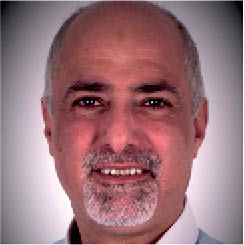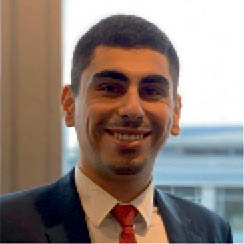

As one of the leading engineering offices in Jerusalem, our business relies partially on engagement in efforts to upgrade building rights through city hall, the body that issues building permits, and the ministry of interior, the body that approves rezoning plans. COVID-19 immediately affected public offices, leaving our applications on the shelves and queries unanswered. Within two weeks, this department and its several architects were out of work. We suffered another severe setback in construction, where we manage and supervise building sites, especially in the Old City. Rather than working on twelve sites, we now work on only one. Preparation for future works has been put on hold: three contracts ready for signature have been postponed, five bids remain in sealed envelopes. As a Jerusalem-based firm (that pays heavy taxes), we have been able to benefit from our right to compensation, however, which alleviates some of the repercussions. We hope that once we get back to business, we can quickly recover and get back on track.
Architect Simon Kouba, CEO Simon Kouba Consultants Ltd.

Zajel Advertising was established in 1996, and specializes in custom signs, large-scale printing, and various advertising materials. As an advertising pioneer in Ramallah, we continuously had to adapt to Palestine’s fluctuating economy and accept security and market risks. Although the latter half of 2019 was difficult economically, dispersing company reserves, we moved to expand in early 2020. Zajel purchased several new machines, two of which had been delivered when COVID-19 began to headline world news and a third was pending delivery. Production at Zajel has been halted entirely since March 22. All work orders are on pause. Our production facility is inaccessible and new machinery idle. We mustered resources to cover company commitments for a reasonable amount of time. Government intervention, however, is vital to ensure market recovery (e.g., coerce banks to facilitate loans and drop interest rates during and – for some time – after this emergency, taking responsibility for private-sector wages and pumping money into the economy as soon as the market reopens).
Imad Abu Tair, engineer and production manager, April 20, 2020

Founded in 2015 and located in Al-Bireh, Procure.ps specializes in consulting and procurement outsourcing. Initially, the closure affected us harshly because our core income comes from services that we provide to clients in the private sector and to banks, most of which have been ordered to shut down or reduce their services. But we took the decision to make a fast adaptation to the changing market demands caused by the new, emergency situation. This was not difficult for us, as our team is used to working in hazardous situations and has built excellent relations with sources all over the globe. We thus switched our services and supply three items that the Palestinian market currently requires, namely ethyl alcohol as a raw material for production, particulate respirators, and hand-sanitizing gel. In order to implement the new project, we have expanded our team and hired two additional employees – and all are working from home.
Mahmoud Khweis, CEO Procure.ps

As charitable NGOs are funded mainly by local or international businesses, governments, or funding agencies, the impact of the COVID-19 pandemic is expected to be enormous. These funders will be struggling to recover from the repercussions of the crisis, and it will be less of a priority, even impossible for them, to allocate funds for charitable societies. In Palestine, on the other hand, more needy people will emerge from this situation, and more money will be needed. The only possible way out of this difficulty is to deal and cope with the situation and live more carefully to minimize the pandemic’s negative effects. Measures we can take today include restructuring administrations, reducing running costs, and moving towards increasing production through shared agreements with local businesses. In addition, projects and activities should be implemented by exchanging expertise between institutions through establishing a “Time Bank,” sharing experts through timeshare rather than monetary compensation.
Naseer R. Arafat, Director, Civil Society of Nablus Governorate

Since I work as a risk management consultant for the largest consulting company in the world, my family and I are managing just fine financially – perhaps even better since we are all still working but don’t leave the house and thus, spend less. Our situation, however, does not reflect the reality of the majority of the Arab communities in the region that suffer from very high unemployment rates.
Furthermore, it is difficult to determine the proper course of action for businesses and institutions in our current situation because this is the first time our modern global economic/monetary system faces a shock that has emanated from a non-financial incident. Looking ahead, we see that crises like these emphasize the importance of risk management functions within a business, institution, or family unit. While nobody expects everyone to manage risks at the level of financial institutions, all should habitually arrange their financial affairs so that they can accommodate a minimum of two months without income.
Louis Salem

Even though outsourcing services are generally slowing down, we are still working at full capacity due to our clients who offer online education and e-commerce products. To provide them with high-quality services, we have established a comprehensive work-from-home approach. Although we face some complications in managing people online, we are noticing a higher level of team productivity. Other types of clients, such as retail businesses, are severely affected and have shut down most business activities except for emergency maintenance. Moreover, clients have stopped all projects proposed for 2020, so we expect to stay at our current business capacity. Growing a business is not an easy option this year.
Thaer Ayasi, CEO, Transcend

Companies and individuals working in software development continue to perform their daily duties as they work remotely, without affecting the overall output or quality of work. While the pandemic has not affected the workflow, it has affected newly formed companies since some investors have chosen to channel their money elsewhere, causing the companies to downsize. Compared to the overall economy, however, the pandemic’s effect on the IT industry might be the lowest. As software developers in Palestine, we keep up with the latest technologies and tools available worldwide and can provide high-quality work, competing with international companies (especially those in Canada and the United States) and their on-site developers – while remaining in Palestine. Considering how other sectors are affected by this crisis, it looks like the Palestinian government should pay more attention to the tech industry. Hundreds of teams in Palestine are still playing a pivotal role in the advancement and development of international companies such as Microsoft, Cisco, NVIDIA, and others. In short, we are still in the game!
Wajed Afaneh, senior technical team leader, Asal Technologies


